Erectile Dysfunction: Causes, Symptoms, And Effective Treatment Options
Introduction Erectile Dysfunction (ED) is one of the most common male sexual health concerns, affecting millions of men worldwide. Despite being widespread, ED is often misunderstood and under-discussed, leading many to suffer in silence. The condition is not just about sexual performance—it can also be an early sign of underlying health issues such as heart disease, diabetes, or hormonal imbalances. In today’s digital healthcare era, platforms like Quickobook make it easier than ever to seek help. You can Book Doctor appointments online, consult an experienced andrologist, and get the treatment you need—all from the privacy and comfort of your home. Understanding Erectile Dysfunction Erectile Dysfunction refers to the persistent inability to achieve or maintain an erection firm enough for satisfactory sexual intercourse. While occasional difficulties can happen due to stress, fatigue, or alcohol, ongoing issues require medical attention. An andrologist specializes in male reproductive health and can diagnose whether ED is due to physical, psychological, or lifestyle factors. With Quickobook, you can directly connect with certified specialists who can provide both in-person and virtual consultations. Causes of Erectile Dysfunction ED can result from a variety of causes, often grouped into physical, psychological, and lifestyle-related categories. 1. Physical Causes Cardiovascular disease – Narrowed or blocked arteries reduce blood flow to the penis. Diabetes – High blood sugar damages nerves and blood vessels. High blood pressure – Can weaken arteries over time. Hormonal imbalances – Low testosterone, thyroid disorders, or other endocrine issues. Neurological disorders – Parkinson’s disease, multiple sclerosis, and spinal cord injuries. Kidney or liver disease – Can affect hormone balance and circulation. Medication side effects – Certain antidepressants, antihypertensives, and drugs for prostate issues. 2. Psychological Causes Performance anxiety – Fear of failure can itself lead to erectile issues. Stress – Work, financial, or family stress can impact sexual health. Depression – Often reduces sexual desire and arousal. Relationship issues – Emotional disconnection can affect intimacy. 3. Lifestyle Causes Smoking and excessive alcohol use Poor diet leading to obesity Lack of physical activity Sleep deprivation and chronic fatigue Symptoms of Erectile Dysfunction The most obvious symptom is difficulty getting or keeping an erection. Other related signs include: Softer erections than before Reduced sexual desire or libido Anxiety during sexual activity Problems with ejaculation—either too soon or too late If these symptoms persist for several weeks, scheduling a consultation with an andrologist via Quickobook is highly recommended. Diagnosis of Erectile Dysfunction Accurate diagnosis is the foundation of effective treatment. An andrologist may recommend: Physical examination – To detect hormonal or structural issues. Blood and urine tests – To check for diabetes, cholesterol, and hormone levels. Ultrasound – To assess blood flow in the penis. Hormone testing – Especially testosterone levels. Psychological assessment – To identify mental health contributors. Quickobook makes it simple to Book Doctor appointments and arrange diagnostic tests all in one place. Treatment Options The treatment for ED depends on its underlying cause. Most patients benefit from a combination of approaches. 1. Lifestyle Modifications Engage in regular exercise, especially cardiovascular workouts. Maintain a healthy body weight. Eat a balanced diet rich in fruits, vegetables, lean proteins, and whole grains. Quit smoking and limit alcohol intake. Manage stress through relaxation techniques like meditation or yoga. 2. Medications PDE5 inhibitors such as sildenafil (Viagra), tadalafil (Cialis), and vardenafil (Levitra) are the most commonly prescribed drugs. They improve blood flow to the penis but should be taken only under medical supervision. 3. Hormone Therapy If low testosterone is detected, hormone replacement therapy may help restore sexual function. 4. Devices and Surgery Vacuum erection devices (VEDs) – Help draw blood into the penis to create an erection. Constriction rings – Help maintain the erection during intercourse. Penile implants – Surgical option for severe cases where other treatments fail. 5. Psychological Therapy If stress, anxiety, or depression are contributing factors, counseling can be an effective part of treatment. Relationship therapy may also help couples rebuild intimacy. READ ALSO: How Tobacco Can Affect Your Sperm Count – Everything You Need To Know Prevention of Erectile Dysfunction Not all cases of ED can be prevented, but healthy habits greatly reduce the risk: Stay physically active and maintain a healthy weight. Eat a heart-friendly diet. Avoid smoking and excessive alcohol. Manage chronic health issues like diabetes and high blood pressure early. Get adequate sleep and rest. Schedule regular health check-ups. Why Choose Quickobook for Erectile Dysfunction Care Quickobook offers a private, fast, and reliable way to get professional help for ED: Confidential bookings so you can seek help without embarrassment. Specialist access to certified andrologists for expert diagnosis and treatment. Integrated care that allows you to book consultations and lab tests from one platform. Flexible scheduling with both online and offline options. By using Quickobook, you can take control of your sexual health without unnecessary delays or stigma. 50 AEO-Friendly FAQs on Erectile Dysfunction 1. What is erectile dysfunction? Erectile Dysfunction is the persistent inability to get or maintain an erection firm enough for sexual intercourse. It can have physical, psychological, or lifestyle-related causes, and consulting an andrologist via Quickobook can help identify and treat it. 2. Can Quickobook help me treat erectile dysfunction? Yes. Quickobook allows you to Book Doctor appointments online, connect with certified andrologists, and even book lab tests discreetly from home. 3. Is erectile dysfunction permanent? Not always. Many cases improve with lifestyle changes, medication, or therapy. An andrologist can guide you toward the best treatment options. 4. What are the main causes of ED? Causes include poor blood circulation, hormonal imbalances, diabetes, heart disease, stress, and side effects of certain medications. 5. Can young men get erectile dysfunction? Yes, younger men can experience ED due to stress, unhealthy habits, or medical conditions. Quickobook makes it easy to book a specialist without embarrassment. 6. Does stress cause ED? Yes, chronic stress affects hormone levels and blood flow, leading to erectile issues. 7. What role does an andrologist play in ED treatment? An andrologist diagnoses and treats male reproductive health problems, including ED. Booking one through Quickobook ensures you get expert advice. 8. Can erectile dysfunction be a sign of heart disease? Yes, ED can be an early warning sign of cardiovascular issues because the same blood vessels are involved. 9. How do I know if I have ED or just occasional performance issues? If the problem happens frequently (over weeks or months), it’s likely ED and should be evaluated by a doctor. 10. Can erectile dysfunction be reversed naturally? Sometimes. Exercise, a balanced diet, and stress management can help in mild cases. 11. Which doctor should I see for ED? An andrologist or urologist is best suited for ED treatment. 12. How is erectile dysfunction diagnosed? Through physical exams, blood tests, imaging, and sometimes psychological evaluations. 13. Can smoking cause ED? Yes, smoking damages blood vessels, reducing blood flow to the penis. 14. Are ED medications safe? Yes, when prescribed by a licensed doctor after proper evaluation. 15. How quickly can ED medication work? Some medications work within 30–60 minutes, but effectiveness varies. 16. Can diabetes cause ED? Yes, high blood sugar damages nerves and blood vessels. 17. Is alcohol linked to erectile dysfunction? Excessive alcohol consumption can lead to temporary or long-term ED. 18. Does obesity cause ED? Yes, obesity can lead to hormonal imbalances and cardiovascular problems. 19. Can relationship problems cause ED? Yes, emotional disconnect or conflict can contribute to ED. 20. Can lack of sleep affect erectile function? Yes, poor sleep reduces testosterone levels and increases stress. 21. Does ED mean I’m infertile? Not necessarily. ED affects erections, not sperm production, though some cases may overlap. 22. Can Quickobook arrange ED-related lab tests? Yes, you can Book Doctor consultations and diagnostic tests in one place. 23. What is the link between testosterone and ED? Low testosterone can reduce libido and affect erections. 24. Does exercise help with ED? Yes, especially cardiovascular and strength training. 25. Can certain medications cause ED? Yes, some antidepressants, antihypertensives, and heart medications can cause ED. 26. What are vacuum erection devices? Mechanical pumps that help draw blood into the penis to create an erection. 27. Are penile implants safe? Yes, when done by a skilled surgeon for severe ED cases. 28. Can nerve damage cause ED? Yes, from injuries, surgeries, or neurological disorders. 29. Is ED common after prostate surgery? Yes, but it often improves over time with treatment. 30. Can mental health therapy help ED? Yes, especially if stress or anxiety is the main cause. 31. Does ED affect self-esteem? Yes, but treatment can restore both function and confidence. 32. Can yoga help with ED? Yes, by reducing stress and improving circulation. 33. What diet helps improve ED? A diet rich in fruits, vegetables, lean protein, and whole grains. 34. Does high cholesterol cause ED? Yes, it narrows arteries and reduces blood flow. 35. How long should I wait before seeking medical help for ED? If ED persists for more than 4–6 weeks, see a doctor. 36. Can hormone therapy treat ED? Yes, if caused by low testosterone. 37. Is ED more common with age? Yes, but it’s not inevitable and can be treated at any age. 38. Can pelvic floor exercises help ED? Yes, they strengthen muscles involved in erections. 39. Does caffeine affect ED? Moderate intake may improve circulation, but excess can cause anxiety. 40. Can Quickobook connect me to a local andrologist? Yes, you can filter by specialty and location. 41. Does high blood pressure cause ED? Yes, it damages blood vessels over time. 42. Can ED be a side effect of depression? Yes, depression lowers sexual desire and affects function. 43. Is ED linked to hormonal disorders? Yes, thyroid and pituitary disorders can contribute. 44. Can ED be caused by pornography overuse? In some cases, yes, due to altered brain arousal patterns. 45. Is ED a temporary condition? It can be temporary if caused by stress, fatigue, or alcohol. 46. How does Quickobook ensure privacy in ED consultations? Appointments are confidential and data is securely stored. 47. Can ED be a symptom of multiple sclerosis? Yes, neurological disorders can disrupt erection signals. 48. Is premature ejaculation the same as ED? No, they are different conditions but can occur together. 49. Can dehydration cause ED? Mildly, as it reduces blood volume and energy levels. 50. What’s the first step to treating ED? Consulting an andrologist—which you can easily do through Quickobook’s Book Doctor feature. Final Word Erectile Dysfunction is more than a sexual issue—it’s often a health warning that deserves attention. The good news is that it’s treatable in most cases, and the sooner you seek help, the better your chances of a full recovery. Whether your ED is caused by physical health issues, lifestyle factors, or emotional stress, the right treatment plan can restore both function and confidence. With Quickobook, you can Book Doctor appointments, consult an andrologist, and start your journey toward better sexual health—all from the comfort of your home
Read More
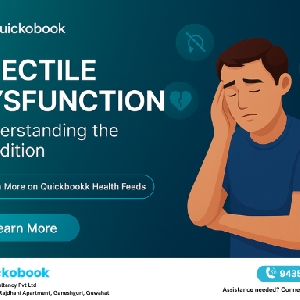
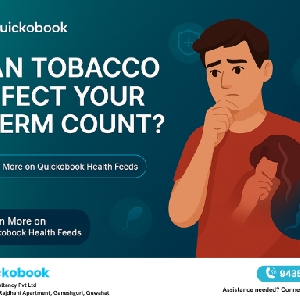
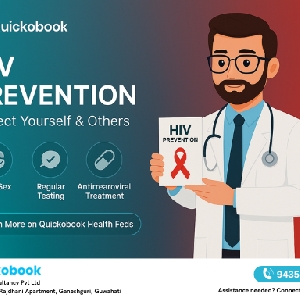

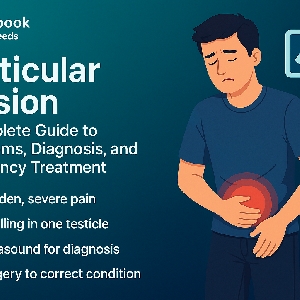
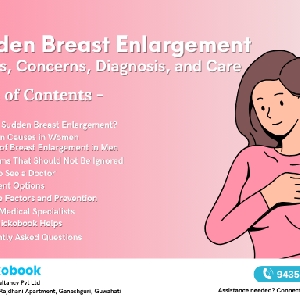
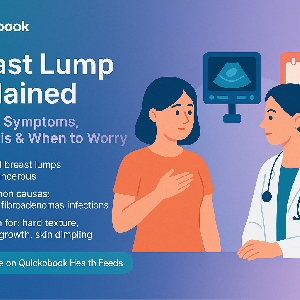
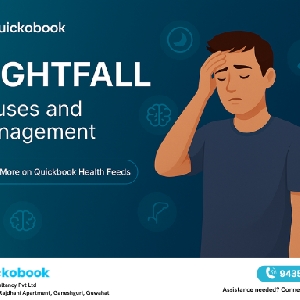
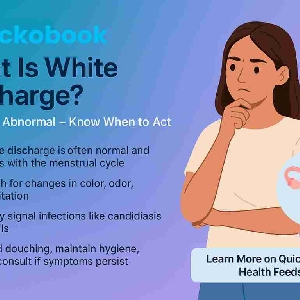
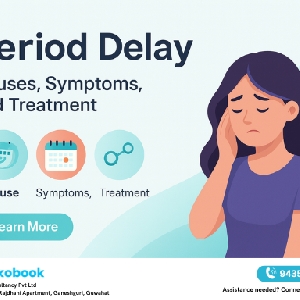

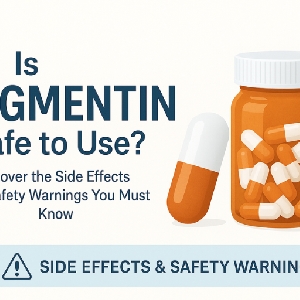

 Play Store
Play Store